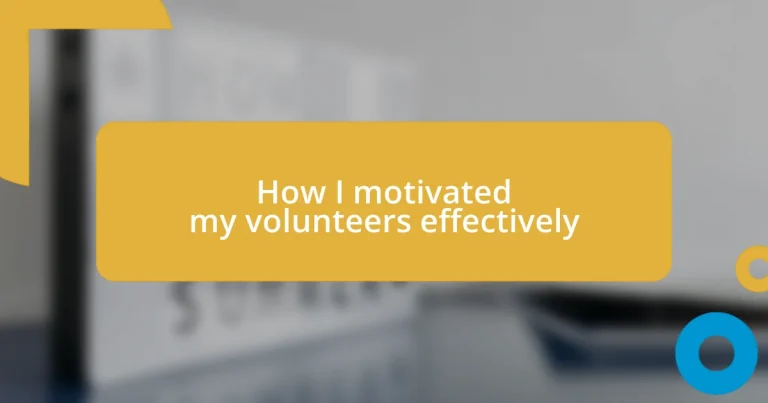Key takeaways:
- Understanding and acknowledging volunteer motivations fosters engagement and personal fulfillment, making volunteers feel valued and connected to the cause.
- Identifying individual goals through open dialogue leads to tailored initiatives, enhancing personal development and community contribution.
- Consistent feedback, support, and celebrating achievements reinforce motivation, build morale, and strengthen the team environment.
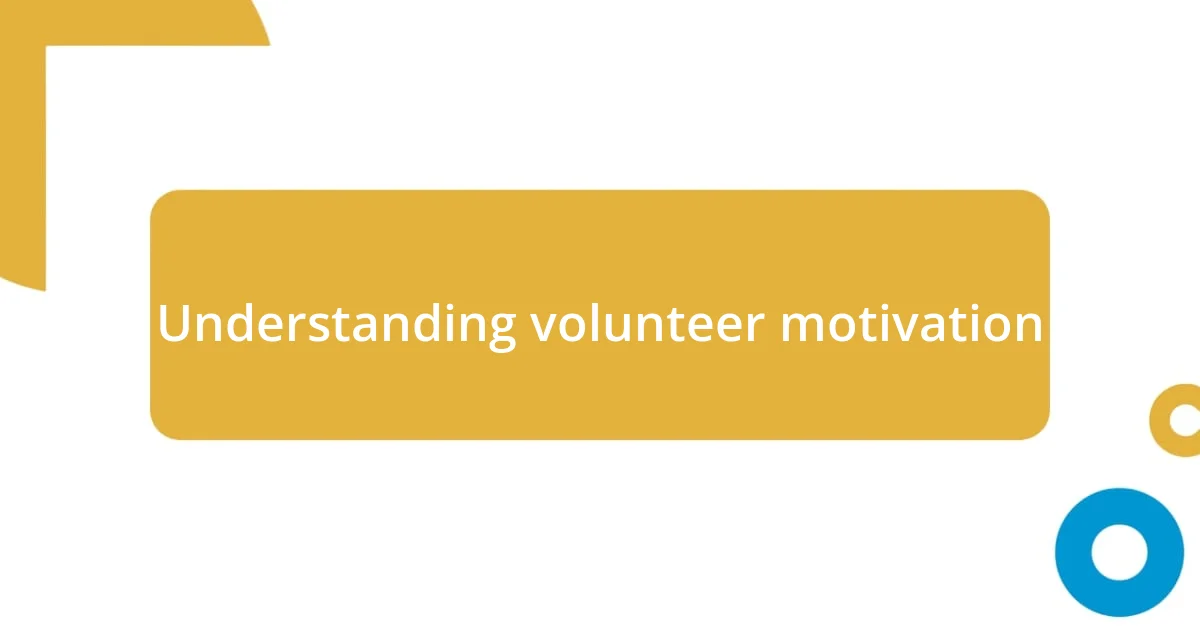
Understanding volunteer motivation
Understanding what drives volunteers is crucial for effective engagement. I remember one time, I spoke with a volunteer who shared that her main motivation was personal fulfillment. It struck me that many people give their time not just to help but to find a sense of purpose in their lives. Isn’t it fascinating how motivation can be so personal and yet universally shared?
Volunteers often seek a connection—both to the cause and to the community around them. I’ve seen firsthand how a simple gesture, like acknowledging a volunteer’s hard work, can ignite a spark of passion. When I made it a point to express my gratitude regularly, I noticed volunteers felt more valued and engaged. Can you imagine how powerful it is to recognize someone’s contribution and the impact it can have on their motivation?
Understanding these motivations allows us to create tailored experiences for our volunteers. For instance, I learned that many of my team members craved skill development, so I initiated workshops to help them grow. This not only nourished their desire for personal growth but also strengthened our collective efforts. What motivates your volunteers?
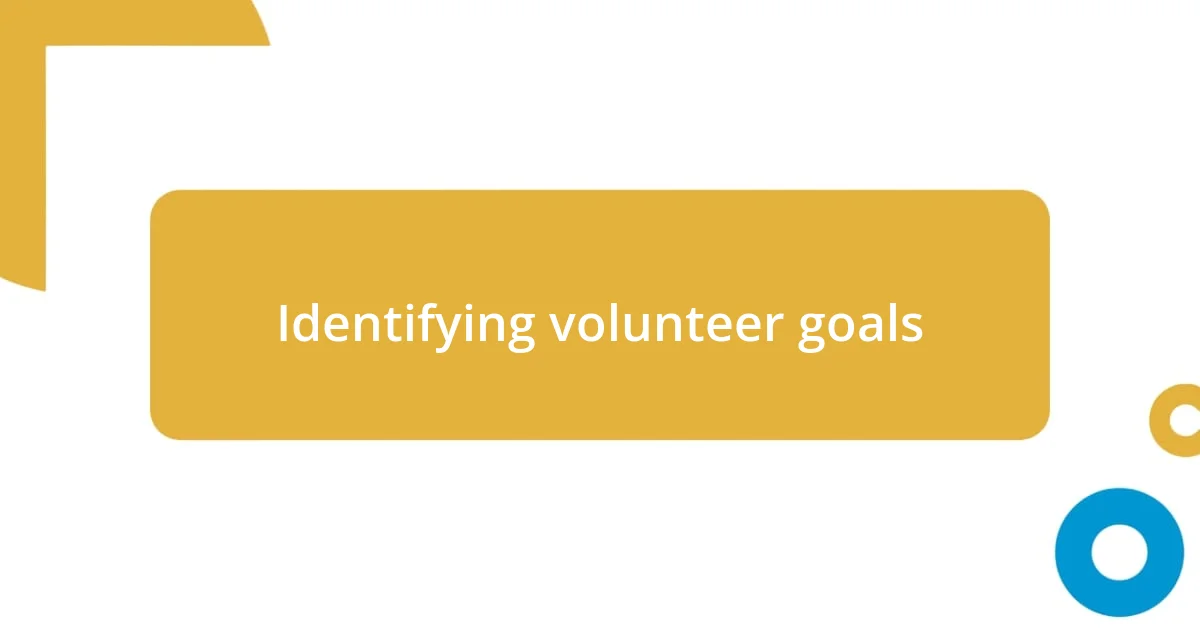
Identifying volunteer goals
Identifying the goals of your volunteers is essential for fostering a sense of purpose and direction. I vividly recall a brainstorming session with my volunteers where we mapped out their individual goals. This exercise revealed how their aspirations ranged from gaining new skills to making meaningful connections within the community. It was enlightening to see them articulate what they wanted to achieve, and it helped me tailor our initiatives accordingly.
When volunteers express their goals, it’s like unlocking a treasure chest of motivation. One volunteer once shared her dream of launching a community garden project. By supporting her vision, not only did she feel empowered, but it also brought a fresh and exciting opportunity for our entire team. This taught me that embracing and nurturing the personal objectives of volunteers can lead to innovative outcomes that benefit everyone involved.
Creating an environment where volunteers can identify and share their goals ultimately builds a strong sense of community. I often encourage open dialogue about their ambitions, which has transformed our volunteering experience. For instance, one of the outcomes was the establishment of a mentorship program that pairs seasoned volunteers with newcomers. This initiative not only supports individual growth but also reinforces the collective mission of our group.
| Volunteer Goals | Impact on Engagement |
|---|---|
| Personal Development | Boosts confidence and skills |
| Community Contribution | Enhances connection and purpose |
| Networking Opportunities | Fosters collaboration and support |
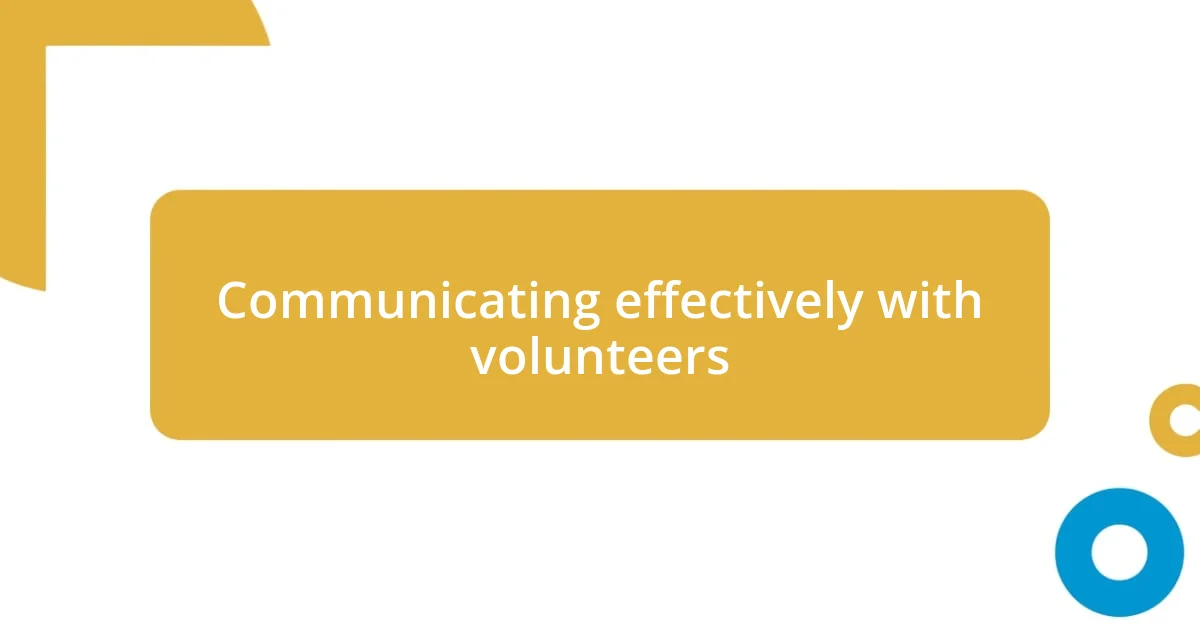
Communicating effectively with volunteers
Effective communication with volunteers is key to cultivating a motivated team. I’ve always found that being transparent about expectations can make a huge difference. I recall a time when I organized a project kickoff meeting where I laid everything out, from timelines to roles. Volunteers responded positively; they felt empowered and understood what was expected of them, which noticeably increased their enthusiasm.
To further enhance communication, I recommend these strategies:
- Regular Check-ins: Short, informal chats can do wonders to keep volunteers motivated and engaged.
- Active Listening: Take time to hear their concerns and ideas. It builds trust and promotes a sense of belonging.
- Celebrate Wins: Sharing successes, whether big or small, fosters a culture of appreciation.
- Tailored Messaging: Adapt your communication style based on individual preferences. Not everyone responds to the same approaches.
- Feedback Loops: Encourage volunteers to share their thoughts on processes and projects to improve and build a sense of ownership.
By focusing on clear, open communication, I’ve seen volunteers not only stay engaged but also become advocates for our mission. It’s a beautiful cycle.
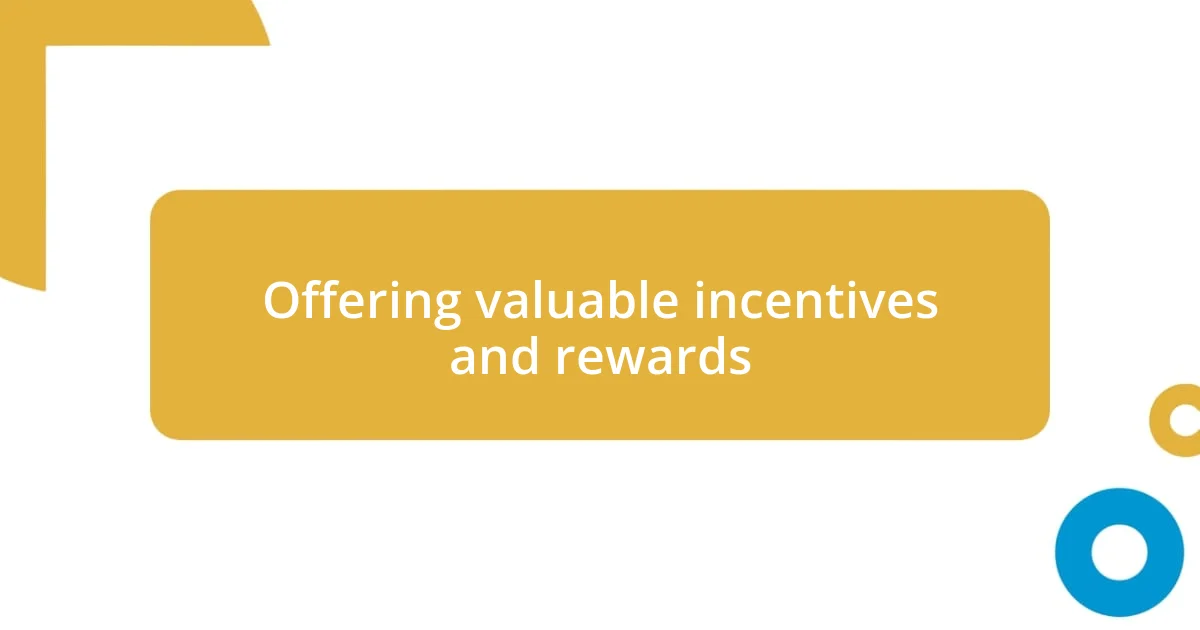
Offering valuable incentives and rewards
Offering valuable incentives and rewards can be a game changer when it comes to motivating volunteers. I discovered this firsthand during a fundraising campaign; we organized a friendly competition where volunteers earned points for every task completed. The thrill of competition not only drove engagement but also made the work feel more rewarding. It was incredible to witness how enthusiasm soared, and volunteers were excited to earn rewards like gift cards or recognition certificates.
I often wonder how small gestures can leave a lasting impact. One time, we celebrated our volunteers’ hard work through a simple appreciation dinner. Not only did it create a warm atmosphere, but hearing their laughter and seeing their smiles reminded me that sometimes, it’s the experiences we share that hold the greatest value. It reinforced the idea that offering meaningful rewards—whether tangible or experiential—can foster deeper connections between volunteers and the mission we share.
Additionally, I learned that understanding what truly motivates my volunteers is crucial. During a casual chat, one volunteer expressed how much she valued professional development opportunities. To meet that need, we created tailored workshops that helped her expand her skills while achieving our project goals. By aligning rewards with personal aspirations, I have found that enthusiasm and commitment flourish, turning our collective efforts into a vibrant and fulfilling experience.
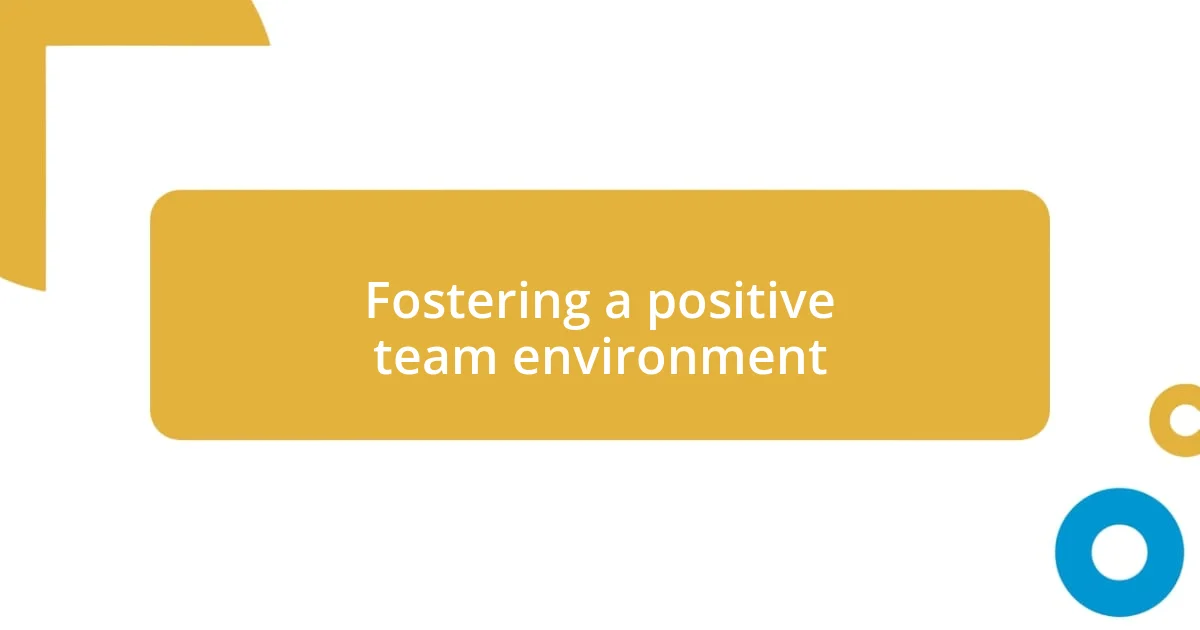
Fostering a positive team environment
Creating a positive team environment is like nurturing a garden; it requires care and attention. I remember when we introduced a weekly team huddle—something simple yet effective. It became a space where everyone felt safe to share their ideas and concerns, which not only strengthened our relationships but also stimulated creativity. Doesn’t it feel rewarding when team members not only participate but also thrive in an environment that promotes open dialogue?
When I reflect on fostering a supportive atmosphere, I think about my efforts to recognize each volunteer’s unique contributions. One time, a quieter member of our team suggested a simple improvement for our workflow. I made a point to highlight her suggestion during our next meeting, and the gratitude on her face was priceless. It reinforced the idea that every voice matters, and acknowledging efforts—even small ones—can empower individuals to come forward more often. How might small acts of recognition help to elevate morale within your team?
In my experience, infusing a sense of fun and camaraderie is essential for building a positive environment. We once had a themed costume day where volunteers dressed up related to our project’s theme, and the entire day was filled with laughter and excitement. It created a closer bond among everyone and broke down barriers that often exist in more formal settings. If we take the time to incorporate joy into our work, our team environment can become a space where volunteers feel not only valued but also genuinely excited to be part of something bigger.
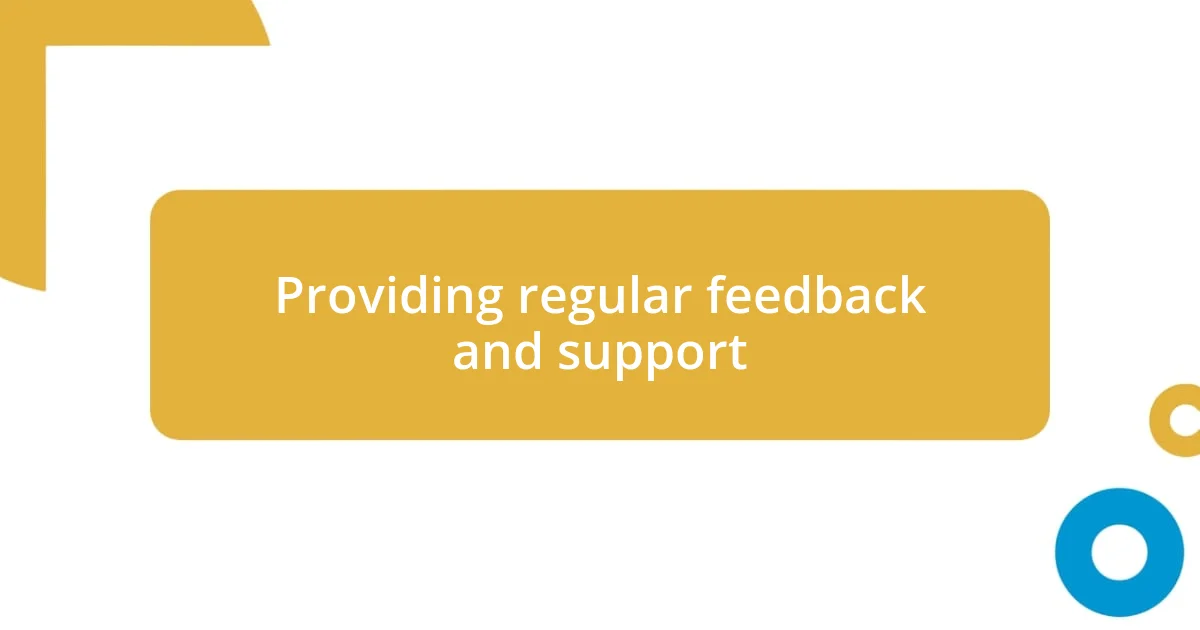
Providing regular feedback and support
Providing regular feedback and support has been pivotal in my journey with volunteers. I recall an instance when I implemented check-in emails after major events. These weren’t just about logistics; I took the time to express my appreciation for their hard work and mentioned specific contributions that made a difference. It was gratifying to receive responses filled with excitement and a renewed sense of purpose. Doesn’t it feel reassuring when someone recognizes your efforts?
I find that being available for one-on-one conversations is incredibly beneficial. There was a time when a volunteer approached me, feeling underwhelmed after a project wrapped up. We sat down for coffee, and I encouraged her to share her thoughts. It became clear that she was craving feedback to gauge her impact. This conversation not only helped her feel valued but also ignited her passion for future projects. Have you ever considered how much clarity and connection personal conversations can foster?
Regular feedback sessions create an environment of growth. I once started hosting bi-weekly feedback circles, where everyone could give and receive constructive critiques. Each time, it was enlightening to witness how these discussions led to valuable insights and improvements. When volunteers feel supported through honest and constructive feedback, it’s astonishing how their confidence and skills evolve. Isn’t it wonderful to think about the potential that unfolds when we are given the tools to grow?
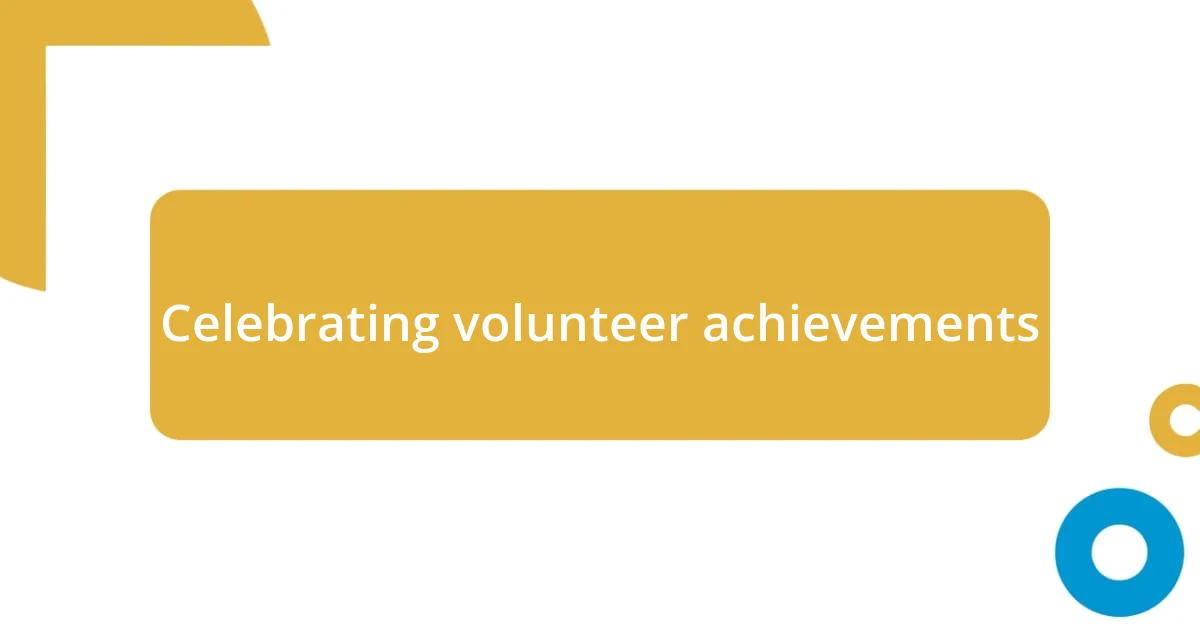
Celebrating volunteer achievements
Celebrating volunteer achievements is an element I deeply cherish in my leadership journey. I recall organizing a small appreciation dinner following a major campaign. Each volunteer received a personalized certificate highlighting their specific contributions, and seeing their faces light up as they realized the impact of their work was genuinely moving. It’s amazing how a seemingly simple gesture can reinforce connection and commitment within your team.
I’ve learned that the act of celebration doesn’t always have to be grand to be meaningful. During a routine meeting, I took a moment to spotlight a volunteer who had consistently gone above and beyond. Sharing their story with the team, I watched as they blushed with pride while everyone applauded. It’s these moments that remind me: recognition nurtures motivation. Have you ever noticed how a heartfelt acknowledgment can ignite a newfound enthusiasm in those around you?
On some occasions, I’ve incorporated fun challenges that lead to an end-of-project celebration. For instance, we once journeyed through a series of community service projects where volunteers earned points based on participation and creativity. The resulting celebration wasn’t merely about the points; it was a moment that allowed us to laugh together and reflect on our shared achievements. That camaraderie and collective joy create lasting memories. How powerful can shared experiences be in strengthening a volunteer team?












